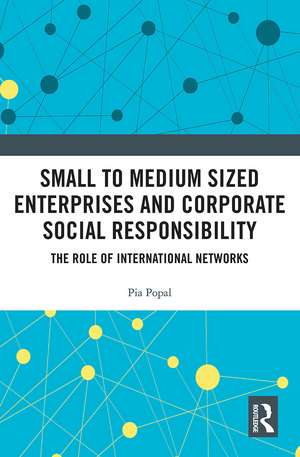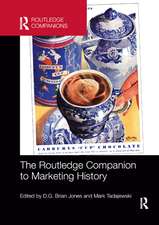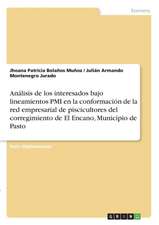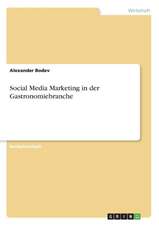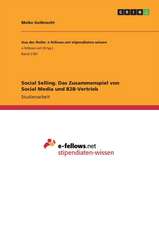Small to Medium Sized Enterprises and Corporate Social Responsibility: The Role of International Networks
Autor Pia Popalen Limba Engleză Paperback – 31 mar 2021
Based on a qualitative empirical study of German small firms’ participation in the most prominent CSR institution, the UN Global Compact, this book explores the drivers for small firm participation. The motivations are complex and do not follow the same hierarchical order associated with large business behaviour. Rather, reasons for institutional engagement suggest a heterarchical structure, where alignment is contingent upon factors such as individual CSR perception, self-conception or social environment.
The book explains why small firms prefer to engage in sustainable development within institutionalised forms of CSR rather than act in isolation, and provides recommendations on how to support and thus increase SME participation in institutionalised forms of civic engagement.
| Toate formatele și edițiile | Preț | Express |
|---|---|---|
| Paperback (1) | 384.66 lei 6-8 săpt. | |
| Taylor & Francis – 31 mar 2021 | 384.66 lei 6-8 săpt. | |
| Hardback (1) | 891.36 lei 6-8 săpt. | |
| Taylor & Francis – 21 aug 2019 | 891.36 lei 6-8 săpt. |
Preț: 384.66 lei
Nou
Puncte Express: 577
Preț estimativ în valută:
73.61€ • 77.04$ • 61.26£
73.61€ • 77.04$ • 61.26£
Carte tipărită la comandă
Livrare economică 31 martie-14 aprilie
Preluare comenzi: 021 569.72.76
Specificații
ISBN-13: 9780367784638
ISBN-10: 0367784637
Pagini: 232
Dimensiuni: 156 x 234 x 14 mm
Greutate: 0.34 kg
Ediția:1
Editura: Taylor & Francis
Colecția Routledge
Locul publicării:Oxford, United Kingdom
ISBN-10: 0367784637
Pagini: 232
Dimensiuni: 156 x 234 x 14 mm
Greutate: 0.34 kg
Ediția:1
Editura: Taylor & Francis
Colecția Routledge
Locul publicării:Oxford, United Kingdom
Public țintă
PostgraduateCuprins
Introduction, Aim of Research, Identifying the Research Gap, Structure of Contribution Part I: Defining Terms 1. The SME Definition 2. Quantitative Characteristics 3. Qualitative Characteristics 4. The many Concepts of CSR 5. Semantic Differences 6. Classical Definitions 7. Critical Voices 8. Voluntary Aspects of CSR 9. International Applicability of the Concept 10. CSR as a Business Strategy 11. CSR as an Institution 12. CSR in the SME Context 13. Private Actors and CSR in Germany Part II: The UN Global Compact 14. Historical Development of the UN Global Compact 15. Aim of the UN Global Compact 16. The German UN Global Compact Network and German SME Part III: Research Process 17. Research Design 18. The Role of Theory 19. Method 20. Data Collection 21. Data Analysis Part IV: Central Assumptions Derived from Institutional Theory 22. Instrumental Elements of Institutions 23. Informational Gain 24. Coercive Pressure Exerted by Larger Corporations 25. Competitive Advantage 26. Cultural-Cognitive Elements of Institutions 27. The Role of Social Legitimacy 28. Sector-Specific Behaviour 29. Normative Elements of Institutions 30. Internalisation of Norms and Values 31. Variations of Institutional Theory as a Response to Critical Voices Part V: Empirical Findings 32. Instrumental Motives for Engagement 33. Increase Visibility 34. Competition 35. Demonstrate Product or Service Quality 36. Informational Gain 37. Coercion 38. Social Elements of Engagement 39. Legitimacy 40. Sector-Specific Behaviour 41. Normative Elements of Engagement 42. Orientation for Structure 43. Internalisation of Guidelines 44. Pro-Active Engagement 45. Revision of Certain Aspects in the Findings 46. Global Elements of Engagement 47. Voluntary Self-Regulation 48. Occurrence of Motives in Different SME and Response Pattern Part VI: Concluding Remarks
Notă biografică
Dr. Pia Popal is currently a project officer for International Cooperation at Munich’s municipal Labor and Economics Department. Dr. Popal received her Ph.D. from the School of Management at the University of Eichstätt-Ingolstadt in Germany. Her research interests include corporate social responsibility, business ethics, social policy and international relations. She served as a reviewer for the Journal of Business Ethics (JBE) and the German International Cooperation (GIZ).
Recenzii
"With CSR having moved from ideology to reality, organizations increasingly make CSR the very heart of their existence. Despite the fact that literature is plentiful with advice on how organizations should design, implement, control, and measure their CSR involvement, unresolved issues still exist, however. Dr. Pia Popal’s new book Small and Medium Sized Enterprises and Sustainability examines why German small and medium-sized enterprises engage with international institutions for voluntary self-regulation such as the UN Global Compact. Where research previously has focused on behavior, Dr. Popal’s research focuses on institutionalized practices. Dr. Popal’s book is a most welcome read and offers important contributions to CSR literature. I recommend the book heartedly."
Professor, Dr. Adam Lindgreen, Head of Department of Marketing, Copenhagen Business School and Extraordinary Professor, Gordon Institute of Business Science, University of Pretoria
Professor, Dr. Adam Lindgreen, Head of Department of Marketing, Copenhagen Business School and Extraordinary Professor, Gordon Institute of Business Science, University of Pretoria
Descriere
Explains why small firms prefer to engage in sustainable development within institutionalized forms of CSR rather than act in isolation, and provides recommendations on how to support and increase SME participation.
